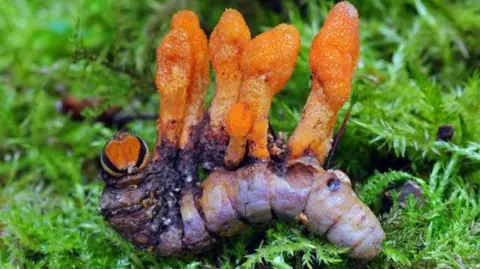Caterpillar fungus found to slow cancer cell growth
 Daniel Winkler
Daniel WinklerA type of fungus that grows on caterpillars can slow down growth of cancer cells, new research has found.
Cordycepin, a chemical produced by a parasitic fungus that infects the animals, interacts with genes to interrupt cell growth signals.
Scientists from the University of Nottingham's School of Pharmacy said the discovery could lead to developing new drugs to treat the disease.
Caterpillar fungus has been used as a medicine and has been a delicacy in parts of Asia for many years.
'Beneficial effects'
The research, published in the journal FEBS Letters, said cordycepin was produced by Cordyceps militaris, an orange fungus which infects caterpillars.
Scientists measured the effects of the chemical on genes and compared its effects to other forms of treatment.
And they found cordycepin interrupts the cell growth signals that are overactive in cancer.
Cornelia de Moor, from the School of Pharmacy, said: "Our data confirms that cordycepin is a good starting point for novel cancer medicines and explains its beneficial effects.
"For instance, derivatives of cordycepin could aim to produce the triphosphate form of the drug to have the same effect.
"In addition, the data will help with monitoring the effects of cordycepin in patients, as our data indicate particular genes whose activity reliably responds to cordycepin, which could for instance be measured in blood cells."
Follow BBC Nottingham on Facebook, on X, or on Instagram. Send your story ideas to [email protected] or via WhatsApp on 0808 100 2210.
